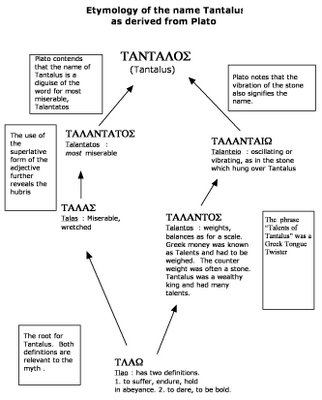

The release of the Mitchell report concerning steroid use in baseball essentially confirms what everyone suspected but pretended not to know. People are shocked…shocked that so many players have been implicated. Some new names have emerged, especially pitchers Roger Clemens and Andy Petitte. Still the litany of names is sobering. Furthermore, many sportswriters are saying that there are many more names not in the report but that “everyone” knows they’re doing it. And baseball isn’t even testing for Human Growth Hormone (HGH) at this point. Sports are a reflection of the culture IMHO. So, I’ll briefly ride on my hobbyhorse, namely living in the age of tantalization.
Tantalus was a wealthy king, who was not satisfied with his mortal powers and mortality. Seeking to have what the gods have, he cheats or commits crimes designed to acquire his objects of desire (Nectar and Ambrosia). In one version of the myth he even chops up his son in an attempt to make himself level with the gods. He is caught and punished by being eternally tantalized (seeing what he wants but having it hang just out of reach).
There are many forces in society tempting us toward immediate gratification, and we seem to crave a never-ending onslaught of excitements and powers. The thrills don’t necessarily last too long. So we can set off in search of the next big thing or pick-me-up. Fans liked seeing the legendary records fall or be obliterated, since it is also a thrill to “be a part of history”, even as a witness. In Tantalizing Times –now available at a big discount through Amazon :>)--- I wrote:
Steroids have been the subject of much controversy in recent years. These have tended to be used by male athletes looking to get some kind of edge. They enhance muscle mass, and guys have been able to get pumped up on them and achieve almost unreal sorts of muscle development. They are used to assist the athlete to become stronger and more powerful, in addition to assisting the athlete to develop the body of a Greek god. Questions were raised about the productivity of many athletes as records began to fall in numerous sports. Football players and baseball players have especially been tempted to swallow steroids in the hopes of obtaining athletic immortality. Curiously steroid use has potential health risks and not only enhancement potential. Considering the theme of the book, its risks are almost poetic, namely the potential for shrinking of the testicles and of impotence. Although they temporarily can help one climb to the top of the heap, excessive use could easily produce a person with many of the characteristics of premature aging and impaired capacity to reproduce. Pg. 53
Although steroids affect muscles (more than brain) my focus here lies on the prospect of opening the door for mind drugs as enhancers. The same arguments will be used. In the case of using an enhancer to get the advantage, we abandon whatever investment we have had in something like will power or determination as well as effort. If activities are made easy by intake of pharmaceuticals, then the outcome is privileged over the process and we acclimate ourselves to the notion that anything worth having is worth being acquired via a bottle or needle. In fact it clearly sets the stage for an entitlement viewpoint to reign supreme. Pg. 80



